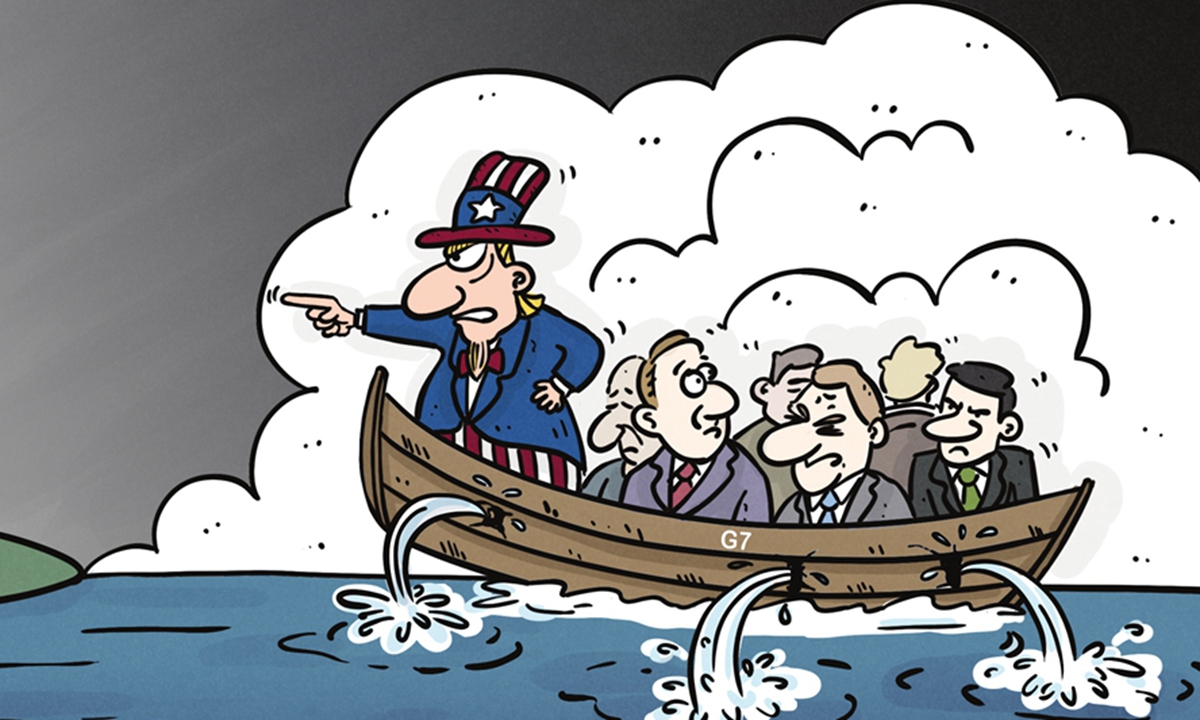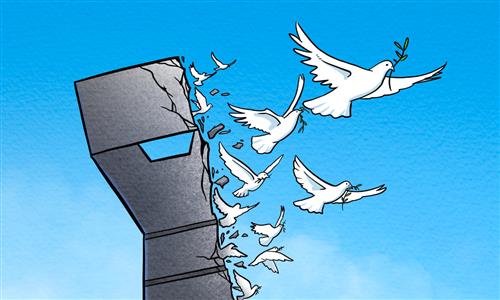
Illustration: Chen Xia/GT
British Prime Minister Rishi Sunak claimed in the Westminster parliament this week that UK fighter jets' interception of Iranian drones and missiles launched against Israel at the weekend was part of his nation's commitment to "supporting stability and security."
He declared that British forces were at the "forefront" of meeting any threats, and listed military engagements in which the armed forces are involved. Anyone listening might have been forgiven for thinking that they had traveled back in time to the British Empire era.
The engagements - the Royal Navy patrolling the southern Red Sea, Royal Air Force jets "policing" the skies over Syria and Iraq, a British Army detachment peacekeeping in Kosovo - are important, but hardly the sweeping military maneuvers suggested by Sunak's jingoistic tone. This is to be expected in a country where discussing matters of defense sounds increasingly like a call to arms.
In government, Defense Secretary Grant Shapps believes the West is moving from a post-war to a pre-war world. He has predicted conflict with China, Russia, Iran and North Korea within the next five years. Shapps - who is supported by many hawks in his own party - wants to increase military spending to be ready and waiting for a fight, should his fantasy come true. He is also the politician who, following a visit to Kiev, proposed sending British troops into Ukraine and Royal Navy warships into the Black Sea. This should bring his judgment into question.
More worrying than the political rhetoric, however, is that an increasing number of serving and former senior armed forces officers have been pushing the narrative that a war in the near future seems almost inevitable. They have been urging that military budgets be boosted, and numbers of soldiers, sailors and air personnel be increased - and have even posited the reintroduction of conscription.
The head of the British Army, General Sir Patrick Sanders, has said that people should be prepared to help form a "citizen army," trained and equipped to fight in this coming war. Echoing Shapps, he described the UK population as the "pre-war generation." It is more than 60 years since conscription, retained after the end of World War II, was eventually phased out, but many want it returned to provide a pool of potential gun fodder.
A report from a think tank of former defense and security chiefs called New Bletchley has also said Britain must prepare for war and proposed the formation of "a New Model Army." Ex-generals and political and military leaders in the UK called for increased defense spending. This war mentality seems shared by Dutch admiral Rob Bauer, head of NATO's military committee, who told member states to prepare their civilians for war.
However, there is a fundamental problem with constantly predicting war and marching an increasingly militarized population toward it. It risks turning our worst possible fears into the worst possible reality.
When Western policymakers make sanctimonious noises about tooling up to enforce and protect the "rules-based order," what they really mean is the West's "rules-based order." The same goes for "democracy" - which is always good, as long as it is a model of Western liberal democracy. As subscribers to the view that we must live in a unipolar world - led by Washington, of course - and challengers of the notion of a multipolar world, they often seem determined to impose their overpowering worldview, their narrow mindset, on others by force of arms - for fear of losing control of it to someone else. This is their motivation.
The 5th-century historian Thucydides believed that the behavior of politicians and states toward each other was governed by a mixture of fear and self-interest. The Athenian general, who fought in the war against neighboring Sparta, recounted in his History of the Peloponnesian War, that "What made war inevitable was the growth of Athenian power and the fear which this caused in Sparta." Today, this is known as the Thucydides Trap, and it looks very much as if the West is sleepwalking toward a trap of its own construction.
The author is a journalist and lecturer in Britain. opinion@globaltimes.com.cn


